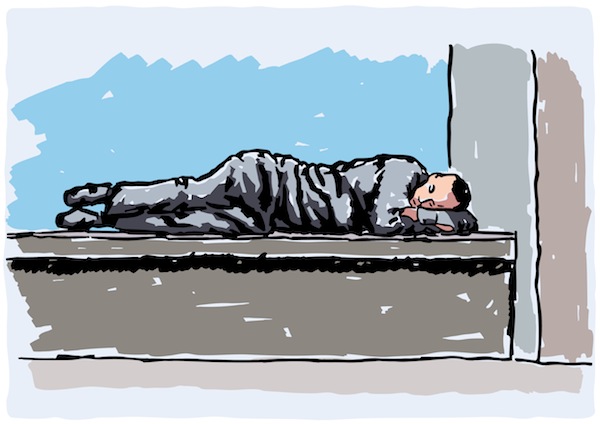 Plans to criminalise rough sleeping in Newport have been dropped following an outcry from campaigners and charities. The proposed measures would have seen begging and rough sleeping in Newport city centre banned and those caught doing so facing prosecution and a fine of up to £1,000.
Plans to criminalise rough sleeping in Newport have been dropped following an outcry from campaigners and charities. The proposed measures would have seen begging and rough sleeping in Newport city centre banned and those caught doing so facing prosecution and a fine of up to £1,000.
The proposal by Newport City Council came under debate following a public consultation which identified issues associated with homelessness in the city as the cause of public concern. In the wake of the council’s defeat, a diluted version of a public space protection order (PSPO) is expected to come into force in the New Year.
Human rights organisations were vocal in their criticism of the proposals and welcomed the decision not to adopt the ban. Rosie Brighouse, legal officer at Liberty said:
It’s shocking that similar proposals to use PSPOs to criminalise the poorest in society continue to surface up and down the country… This won’t house people, move them on, or help resolve their homelessness in any other way… We hope to see more authorities follow Newport’s example [in backtracking].
The Welsh arm of the homelessness charity Shelter, Shelter Cymru described the consultation process used to ascertain public opinion in Newport as ‘flawed’.
While several councillors at a council meeting held on 24 November argued in favour of the ban on the basis of protecting the safety of the general public, others were vocal in their rejection of the ‘draconian’ proposed measures. Councillor Tom Bond called the ban ‘disproportionate’ to the problem faced by Newport: ‘It is vital that we have regard for compassion in our policy making – we cannot ban poverty, we will just move the problem.’ Councillor Jane Mudd agreed, saying ‘It seems to be quite unnecessary to introduce new legislation that will criminalise some of the most vulnerable people in society.’
The rejected plans were initially drafted as part of efforts to make Newport a more appealing place to visit ahead of the opening of a new shopping centre – a twist which seems all the more galling in consideration of the city’s proud history of social justice.
Newport was the site of the 1839 Chartist uprising, which saw protestors marching for the rights of the impoverished working class. In 2013 a mural depicting the Chartist’s march on Newport was demolished to make way for the Friar’s Walk complex, a decision which was widely decried as an act of cultural vandalism. Liberty denounced the proposals to criminalise begging as ‘making a mockery of Newport’s Chartist legacy.’
This news can be seen against the backdrop of a rising homelessness in Wales. A recent report by Welsh homelessness charity The Wallich found a 64% increase in rough sleeping in the country’s capital, Cardiff, between October 2013 and October 2015, a development described by the charity’s Chief Executive, Antonia Watson as ‘very worrying, particularly in the face of potential further funding cuts in 2016/2017’.






